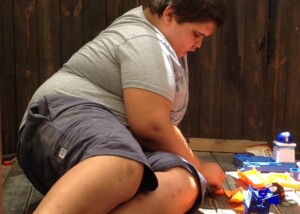When you read that a mom has two kids with autism do you pity her? Do you cringe upon learning someone has three autistic kids?
Here’s why you shouldn’t.
A woman recently told me that her three-year-old, who was fidgeting in her lap, was autistic.
I didn’t feel sorry for her. Not an ounce of pity for the young mother.
Am I coldhearted? No. So why didn’t I feel any kind of sympathy for this mom?
Probably (well actually, extremely likely) because I’m autistic myself.
When she told me that her son had the autism diagnosis, she said it made her sad.
Appearing in her early 20s, she was obviously feeling plight over a big future ahead of herself that included something she never dreamed it would ever include for her child: navigating Autism Spectrum Disorder.
However, for me to pity her because her preschooler is autistic would be kind of like pitying my own mother for having me.
There’s nothing sorrowful about me because I’m on the Spectrum, so naturally, I didn’t feel sorry for this newly-met woman at a Fourth of July fireworks event.
Parents of Autistic Kids Don’t Need Your Pity
“Pity centers on the parent’s suffering and reinforces the idea that autism is inherently tragic, and that’s simply not true,” says Cassie Roybal, who is a late-diagnosed AuDHD licensed professional counselor and founder of EmpowHERed Divergence Therapy.
“Autistic kids aren’t broken or less-than; they’re navigating a world that isn’t built for them,” continues Roybal, who has an autistic child.
“It’s not always easy, but neither is parenting any child.
“The difference is that society doesn’t equip parents of autistic kids with the tools, support or perspective they actually need, so it becomes a chronic uphill battle.
“But the struggle isn’t autism. It’s the mismatch between the child and the system.
“What parents of autistic kids could use a hell of a lot more of is empathy and understanding and support. But never pity.”
You Can Give Support Without Giving Pity
Here’s the thing — pitying parents just because they have an autistic child or two or three isn’t the kind gesture some people think it is.
It actually says more about your assumptions than it does about their lives.
Sure, raising any child comes with challenges, and autism might bring some unique ones — but that doesn’t mean their world is all doom and gloom.
A lot of parents of autistic kids are incredibly proud of their children, and rightfully so.
They see their kids grow, learn, communicate in their own ways and express joy, humor, curiosity — just like any other kid.
When someone says, “Oh, I feel so sorry for you,” it can come off as condescending, like their child is a tragedy or a burden.
It’s fair to point out that, in all the content I’ve read about parents who describe their child’s autism as “severe” or “profound,” there have been some who admitted that they’d give a cure for autism to their child in a heartbeat.
One man posted a comment, to an article about ASD not being a tragedy, that the autism in his son was indeed tragic.
So yes, there are parents who will describe that their experiences of caretaking for their autistic child “is a nightmare.”
Nevertheless, even these parents, who feel beaten down and exhausted with no breaks in between, may still find it very uninviting to be on the receiving end of pity.
Instead, ask about their kid’s interests. Talk to them like any other parent.
You don’t have to ask, “Is Hayzel talking yet?” You could instead ask, “What’s Hayzel’s biggest interest right now?”
Chances are, they’ll light up telling you about how their child can memorize every subway stop in the city or how they’re obsessed with cats, pouring liquids into various containers or drawing letters in different fonts.
Also, pity tends to close doors. It makes people feel like outsiders, like their experience is something to be mourned rather than respected.
Instead of pity, try empathy and curiosity. Recognize that autism isn’t the end of a happy family — it’s just a different path.
And many parents wouldn’t trade their kid or their journey for anything in the world – such as Mary Elizabeth Jackson, who has two autistic boys.


 Cassie Roybal is a late-diagnosed AuDHD therapist (LPC) and founder of
Cassie Roybal is a late-diagnosed AuDHD therapist (LPC) and founder of 







































